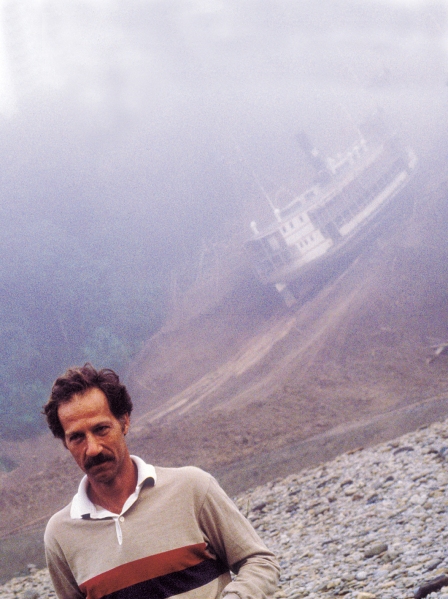
Werner Herzog on location during the filming of Fitzcarraldo, around 1982. One of the most inspiring photographs ever.
The end of the previous post should help us segue back into Herzog nicely. Burden of Dreams is a fascinating film… but it is about Herzog, not by him. That’s a very important distinction, though you can clearly see how much Les Blank reveres and idolizes many things about his subject.
You may be inclined to ask why it is I’m watching SO much Herzog lately. For those who care, things between Werner and I are strictly platonic. The reasons for my Herzog bender… are: my fascination with filmmakers who have methods that the business deems unconventional, my admiration for Herzog’s particular process, my curiosity about it, and for how his mind works and how it is that he is driven to do things the way he does. He’s an amazing artist in a time when there are fewer and fewer individualists left. He is indispensable.
I have a little problem: I don’t have any interest in politics or economics or other such constructs that everyone is convinced are the driving forces of human existence. I only have one interest – the individual. I don’t know why it is that this elusive creature has been sighted rarer and rarer as time goes by. I don’t think it’s true that everything has been done. Someone like Herzog can show us that you can make anything your own. All you need is that one quality that separates human from animal and continues to subdivide humans into kings and knaves: vision. And one who has Vision must be Persistent about it.
Burden of Dreams sensationalizes to some degree the kind of work that Herzog does. Whenever I mention
Herzog to anyone, the response I get is, “Oh my god, have you seen Burden of Dreams? That guy’s fucking crazy.” Now I have finally seen it. And no, he isn’t crazy.
For someone as individualistic as I make him out to be, Herzog has said before that he doesn’t look at himself, he doesn’t look into his eyes in the mirror when he shaves, and he doesn’t even have dreams when he sleeps. For him, the body is nothing but an instrument for the will. And dreams are inextricably connected with reality – he has admitted to having “daydreams” while he travels on foot. He has said that walking is the closest thing to filmmaking. He has this in common with Alan Clarke and his ever-tracking camera, stalking the action like a hunter.
Herzog is an Active filmmaker. There is a violent energy in his films, which comes from the ultimate rebellion: rebelling against health and sense – rebelling against Nature. To rebel even in the most seemingly insignificant way – let’s say, to just stay up late at night until the dawn – is to challenge the patterns that life is hung upon, to make your own pattern. Herzog doesn’t just stay up late. He goes into the Amazonian jungle and with sheer force of will, holds together a production in which everything, absolutely everything goes wrong. At one point he says to Blank, “sometimes I wish I could just sit in an easy chair with a cup of tea.” The idealist in me (or what’s left of the idealist in me) wants to believe that this is the only lie he’s ever told.
Herzog is a very contradictory artist – most great artists are. the great contradiction is that he puts himself and everyone in his crew and cast through the ringer because he believes, and rightly, that there are realities that cannot be faked on a Hollywood set (almost thirty years after the making of Fitzcarraldo he reminisces with much amusement about how the studio he initially tried to make the film through wanted him to shoot it in a Botanic Garden in Southern California… that’s the thing about him: he seems to feel no rage at the obstacles put in his way, only amusement). In this he is very similar to another of my very favorite filmmakers, Jean Renoir. I highly recommend Renoir’s fantastic and invaluable autobiography, My Life and My Films. Renoir was also very passionate about capturing the immediate reality of what he was filming – he never re-recorded sound in a studio, he was convinced that the sound of, say, a pair of heels walking down a wet Parisian street at that particular moment of filming, could not be faked, that even such a small detail would compromise the meaning and impact of a moment. And he was right!

Renoir and crew.
At the same time, Renoir was not bound by these material realities, and the stories he wove on film remain some of the most imaginative and poetic… Herzog is german and Renoir is French. Renoir’s father was the much-loved Impressionist Pierre Auguste, Herzog didn’t use a telephone or listen to music until almost in his adulthood. Herzog is a fighter and Renoir is a lover… yet in their art there are many overlapping points. Not the least of their commonalities is the fact that both have visions so strong that even the occasional imperfections and flaws in their films can be enjoyed, as opposed to overlooked.
Look at that, I seem to have digressed…
Back to Burden of Dreams, then.
As I was trying to say, Herzog puts everyone including himself through very difficult conditions, determined that a sort of truth will emerge. However, even in his documentaries, the truth that you see is not the factual reality of whatever he’s documenting. He mixes reality with his own vision to in the search for a greater truth. Every filmmaker struggles over how to make the strongest possible impression on the audience, and people seem to think that Herzog is too wrapped up in his experiences during shooting to care about what the audience thinks in the end, but I must say that it seems to me that he cares deeply, and feels that it is necessary to leave the strongest possible impression. As he says in Burden of Dreams, the only difference between the poet and the ordinary man is that the poet is able to articulate that which the ordinary man cannot. And Herzog also said in a different interview something that has become a sort of mantra for me: the poet must not avert his eyes.
The title of this post is taken from something Herzog says in Burden of Dreams while trying to organize the native Peruvians, and I think it’s an important question. Are there any more brave men? And are they willing to challenge Nature? To swim against the current as Herzog does is the purest articulation of the very purpose of being human. Why have free will if no to rebel against the unconquerable?

